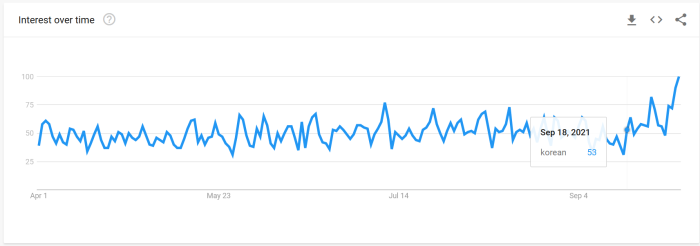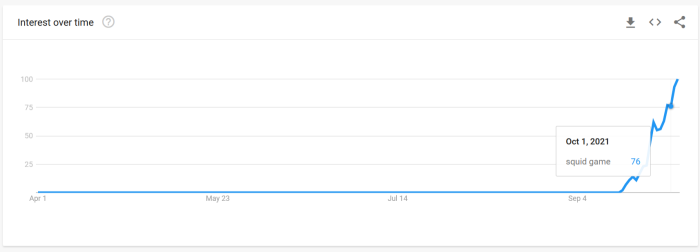How to Learn Korean With Netflix’s Squid Game
When Bong Joon Ho’s Parasite won the Academy Award for Best Film in 2020, a lot of people started to explore the Korean section of Netflix and found out that Korean television and cinema could be every bit as great as American productions (if not better!).
However, it wasn’t until Squid Game that people became really curious about the Korean language and culture. According to Google Trends, interest in Korean started going up on September 18 in Canada, the day after Squid Game was released, reaching its peak popularity at the beginning of October, when discussions about the show also started to heat up.

Trend of searches for Korean

Trend of searches for Squid Games
Does this mean that we will have a steep rise in the number of speakers of Korean as a second language in a few months’ time? As you can imagine, there’s nothing we would like more.
If you became interested in learning Korean because of Squid Game, here are some of the key things that will help you boost your Korean fluency as you revisit the show.
Doesn’t it feel great to have a good excuse for a rewatch?
Warning: Spoilers ahead if you haven’t already seen the show!
→Sign Up Now: Free Trial Korean Lesson With a Native Speaker Teacher!←
Learn Korean Honorifics
As you must know by now, Squid Game tells the story of a group of financially desperate people who are invited to play a series of sinister games for a chance at a large cash prize. Ali, a migrant factory labourer from Pakistan whose boss has withheld his pay for months, is forced to leave his wife and child to take his chance in this deadly competition. As soon as the show gave him a chance to tell his story, Ali immediately became a fan favourite.
Once at the games, his interactions with university-educated Cho Sang-woo provide a nice opportunity to familiarize ourselves with Korean honorifics (as well as a much-needed emotional release!). During most of the show, Ali addresses Cho in a formal manner, calling him seonsaengnim, which is translated as “Sir” in the English subtitles but literally means “superior.”
As the men grow closer, however, Ali starts to refer to Cho as hyung, which translates to “older brother.” This might seem like a small detail, but it is actually a big deal in Korean culture, where a huge emphasis is placed on status, and honorific titles are used to highlight the hierarchical dynamics between different people.
The fact that Ali uses the word hyung to refer to someone he felt he had to look up to and show due respect to is a great way to show how the games have erased the power dynamics between its contestants. And the fact that he still calls him “brother” in the face of betrayal, makes for a truly heartbreaking final scene.
Make the Most of the Subtitles
Upon the release of the show, there was a heated debate regarding the precision of the English subtitles, as English speakers discovered that some of the expressions in the show were inaccurately translated.
Korean speakers, on the other hand, seem much more relaxed. According to the opinion of our Korean teachers, we are only missing out on a few nuances that will not affect our understanding of the plot or the enjoyment that comes with watching such a dynamic, action-packed show.
T.K., creator of the popular blog Ask a Korean, has said to those that allow inconsistent subtitles to put them off from watching the show that they need to “get over it,” adding that, if nuances bother them so much, they should consider taking up Korean lessons.
As you can imagine, we can’t agree more. If the excitement around great Korean cultural products like Parasite and Squid Game translates into more people wanting to learn this fantastic language, you can bet we will be joining in the trend!
View this post on Instagram
But let us go back to the subtitles controversy and how you can use subtitles to learn Korean.
If we are right in assuming you have already finished the show, it means you know the story from start to finish. In fact, you probably discussed characters, plotlines and theories online as you got near the finale. Why not do a rewatch, then, to focus on the language?
Our suggestion is that you set the subtitles in Korean, pause the show every time you recognize a line of dialogue from the first viewing, go back a few seconds, and write it down. If you’re not 100 percent sure you remember what it meant, you can check the English subtitles and see if you were right. By the end of the show, you will have a nice vocabulary bank with the most memorable lines from the show.
Here are our top picks:
You took more from me than whatever I might possibly owe.
[너한테 빚진 거보다 갖다 바친 게 더 많아.]
It doesn’t matter how tough you are, you’re not going to win in this place. Not on your own.
[네가 아무리 독해도, 여기서 독고다이로 지랄해 봤자. 승산 없어.]
How much is the truth? And how much is a lie?
[어디까지가 진짜고? 어디까지가 거짓이야?]
Discover Cultural Differences
One of the most salient aspects of the show is the games that the characters have to play in order to survive and win the big prize. While inattentive viewers might believe that some of these lethal sports are fictional, they are all based on real (much less deadly) children’s games, many of which have English equivalents.
Let’s take a look at some of them.
Juldarigi – Tug of War
This highly physical game was originally played as a Korean communal tradition to bring small communities together and ask for healthy harvests.
Ddakji – Pog
Also called ddakji, this Korean schoolyard game is similar to the American ‘90s game Pog. Played with two tiles —usually made from origami paper—, the goal is to turn around one tile, laying on the ground, by slamming it with the other.
Mugunghwa kkoci pieot seumnida – Red Light, Green Light
The Korean version of “Red Light, Green Light” is not very different from its American counterpart. Players can run towards the finish line during “green light” time, but they must freeze before the tagger turns around at random times and says “red light.” But instead of saying the words “red light” / “green light”, the tagger has to say “The Mugunghwa flower has blossomed,” which alludes to Korea’s national flower.
View this post on Instagram
As you can see, Squid Game is not only an addictive, highly entertaining show. It’s also a great opportunity for learning.
→Sign Up Now: Free Trial Korean Lesson With a Native Speaker Teacher!←
And if you’d like to delve deeper into the Korean culture and language and go beyond honorifics and names of traditional games, you really should consider taking classes with a qualified native Korean teacher! They will be able to give you all the necessary background you will need to understand Korean culture and customs for your following trip, business meeting or family reunion. Contact us now and we’ll pair you up with a Korean teacher so you can learn how to express your own ideas in this wonderful language.
